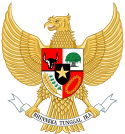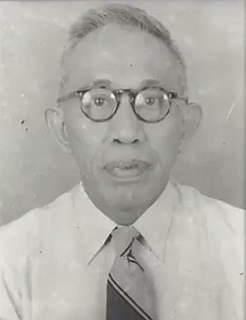 |
|---|
| This article is part of a series on the politics and government of Indonesia |
| Pancasila(national philosophy) |
| Constitution |
Executive |
| Foreign relations |
The province of North Sulawesi in Indonesia is divided into regencies, known as Kabupaten, which in turn are divided administratively into districts, known as Kecamatan.

The Provinces of Indonesia are the 34 largest subdivisions of the country and the highest tier of the local government. Provinces are further divided into regencies and cities, which are in turn subdivided into subdistricts (kecamatan).

North Sulawesi is a province of Indonesia. It is located on the northern peninsula of the island of Sulawesi, on the Minahasa Peninsula, lies south of Philippines and southeast of Malaysia. It borders Philippines to the north, the Maluku Sea to the east, Gorontalo to the west and the Gulf of Tomini to the south. The province's capital and largest city is Manado, and its population was 4,135,526 according to the 2010 census; the latest official estimate is 4,353,540. Manado is also the main gateway and the economic center of the province. Other major towns includes Tomohon and Bitung. There are 41 mountains with an altitude ranging from 1,112–1,995 metres (3,648–6,545 ft). Most geologic conditions are the young volcanic region, a large number of eruptions and the active cone shape of the active volcanoes that adorn the central Minahasa, Bolaang Mongondow and Sangihe Islands.

Indonesia, officially the Republic of Indonesia, is a country in Southeast Asia, between the Indian and Pacific oceans. It is the world's largest island country, with more than seventeen thousand islands, and at 1,904,569 square kilometres, the 14th largest by land area and the 7th largest in combined sea and land area. With over 261 million people, it is the world's 4th most populous country as well as the most populous Muslim-majority country. Java, the world's most populous island, contains more than half of the country's population.
The districts of North Sulawesi with the regency it falls into are as follows:
- Bunaken
- Bunaken Kepulauan
- Malalayang
- Mapanget
- Paal Dua
- Sario
- Singkil
- Tikala
- Tuminting
- Wanea
- Wenang
- Aertembaga
- Girian
- Lembeh Selatan
- Lembeh Utara
- Madidir
- Maesa
- Matuari
- Ranowulu
- Kotamobagu Barat
- Kotamobagu Selatan
- Kotamobagu Timur
- Kotamobagu Utara
- Tomohon Barat
- Tomohon Selatan
- Tomohon Tengah
- Tomohon Timur
- Tomohon Utara
- Eris
- Kakas
- Kakas Barat
- Kawangkoan
- Kawangkoan Barat
- Kawangkoan Utara
- Kombi
- Langowan Barat
- Langowan Selatan
- Langowan Timur
- Langowan Utara
- Lembean Timur
- Mandolang
- Pineleng
- Remboken
- Sonder
- Tombariri
- Tombariri Timur
- Tombulu
- Tompaso
- Tompaso Barat
- Tondano Barat
- Tondano Selatan
- Tondano Timur
- Tondano Utara
- Amurang
- Amurang Barat
- Amurang Timur
- Kumelembuai
- Maesaan
- Modoinding
- Motoling
- Motoling Barat
- Motoling Timur
- Ranoyapo
- Sinonsayang
- Suluun Tareran
- Tareran
- Tatapaan
- Tenga
- Tompasobaru
- Tumpaan
- Airmadidi
- Dimembe
- Kalawat
- Kauditan
- Kema
- Likupang Barat
- Likupang Selatan
- Likupang Timur
- Talawaan
- Wori
- Belang
- Pasan
- Pusomaen
- Ratahan
- Ratahan Timur
- Ratatotok
- Silian Raya
- Tombatu
- Tombatu Timur
- Tombatu Utara
- Touluaan
- Touluaan Selatan
- Bilalang
- Bolaang
- Bolaang Timur
- Dumoga
- Dumoga Barat
- Dumoga Tengah
- Dumoga Tenggara
- Dumoga Timur
- Dumoga Utara
- Lolak
- Lolayan
- Passi Barat
- Passi Timur
- Poigar
- Sangtombolang
- Bintauna
- Bolangitang Barat
- Bolangitang Timur
- Kaidipang
- Pinogaluman
- Sangkub
- Bolaang Uki
- Helumo
- Pinolosian
- Pinolosian Tengah
- Pinolosian Timur
- Posigadan
- Tomini
- Kotabunan
- Modayag
- Modayag Barat
- Mooat
- Motongkad
- Nuangan
- Tutuyan
- Beo
- Beo Selatan
- Beo Utara
- Damau
- Essang
- Essang Selatan
- Gemeh
- Kabaruan
- Kalongan
- Lirung
- Melonguane
- Melonguane Timur
- Miangas
- Moronge
- Nanusa
- Pulutan
- Rainis
- Salibabu
- Tampan’amma
- Kendahe
- Kepulauan Marore
- Manganitu
- Manganitu Selatan
- Nusa Tabukan
- Tabukan Selatan
- Tabukan Selatan Tengah
- Tabukan Selatan Tenggara
- Tabukan Tengah
- Tabukan Utara
- Tahuna
- Tahuna Barat
- Tahuna Timur
- Tamako
- Tatoareng
- Biaro
- Siau Barat
- Siau Barat Selatan
- Siau Barat Utara
- Siau Tengah
- Siau Timur
- Siau Timur Selatan
- Tagulandang
- Tagulandang Selatan
- Tagulandang Utara





